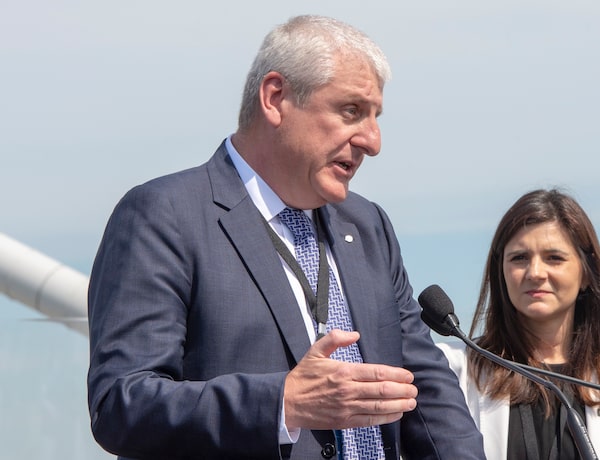
SNC-Lavalin CEO Ian Edwards speaks at the inauguration for the Samuel de Champlain bridge in Montreal, June 28, 2019.Ryan Remiorz/The Canadian Press
In Canada’s last downturn, the global financial crisis that played out 12 years ago, government spending on infrastructure came too late to stimulate the economy and get people back to work.
SNC-Lavalin Group Inc. chief executive Ian Edwards wants to ensure politicians of all stripes learn from past mistakes. The head of one of the world’s largest engineering companies launched a campaign last week that stresses the need for speed on domestic construction projects.
Mr. Edwards is calling on federal, provincial and local governments to adopt innovative approaches to technology and decision-making, the same sort of tactics that allowed SNC to get Montreal’s 3.4-kilometre Champlain Bridge built in four years, when the link was originally expected to take seven years. In an interview ahead of a speech in Montreal last week, Mr. Edwards said: “The point we want to make is there is a better way to deliver infrastructure.”
To kick-start the economy, politicians should prioritize easily achievable projects such as electrifying rail lines or renovating public buildings to improve their environmental performance, said Mr. Edwards, who is giving another speech promoting infrastructure spending to a virtual business audience in Toronto this week. He said these shovel-ready undertakings tick a number of boxes for government – they get people to work quickly and they anchor a greener economy.
“We see government intent to build infrastructure as a form of stimulus everywhere we operate, in Canada, the U.S. and U.K.,” Mr. Edwards said. He said he heard some brave talk from politicians during the financial downturn of 2007-09, but “a lot of infrastructure investments were not even approved until after the crisis was over, missing a valuable window of opportunity.”
The Canada Infrastructure Bank, a $35-billion federal agency created three years ago, is also putting a priority on retrofitting buildings to improve their efficiency. Under recently appointed chair Michael Sabia, former CEO of the Caisse de dépôt et placement du Québec, the bank earmarked $2-billion last moth for real estate projects with private-sector partners, with the bank shouldering the upfront costs on renovations where the long-term cost savings are difficult to determine.
Mr. Edwards is the first to acknowledge that when it comes to infrastructure spending, what’s good for Canada is also good for SNC. Government contracts account for two-thirds of the company’s revenues. The importance of public projects will also rise in the future, as SNC winds down a money-losing division that builds infrastructure for resource companies.
However, as a global player, Mr. Edwards said SNC is well-positioned to import the best practices from governments in other countries, such as Australia and Britain, to Canadian projects.
“In Australia, a leader in infrastructure, you’ve seen government develop the concept of alliancing, where contractors are on the same team as the client, and they develop objectives together,” said Mr. Edwards, adding it is encouraging to see government agencies in British Columbia, Quebec and Ontario taking a similar partnership approach.
SNC recruited Mr. Edwards six years ago from one of Asia’s largest construction companies, Leighton Group. SNC named the British-trained engineer as chief operating officer early in 2019, then promoted him to CEO last October. In December, Mr. Edwards played a leading role in resolving corruption allegations against SNC.
Canada’s construction industry is increasing its use of technology to speed up work and incorporate hard-to-measure environmental criteria into projects, and Mr. Edwards wants to see governments reflect the value of these innovations when awarding contracts. “The current model is not designed to harness the potential of digital, data and new technologies,” he said.
For example, the pandemic is proving the value of “digital twinning,” which allows engineers to test the design and delivery of large-scale projects remotely. And the $4.4-billion Champlain Bridge project showed the value of modular construction, with SNC simultaneously building components at facilities across Quebec, then assembling them like Lego pieces above the St. Lawrence River.
When SNC bids on government work, there’s no allowance for these skills. Mr. Edwards said: “The unintended consequence is to discourage technology adoption.”
Your time is valuable. Have the Top Business Headlines newsletter conveniently delivered to your inbox in the morning or evening. Sign up today.